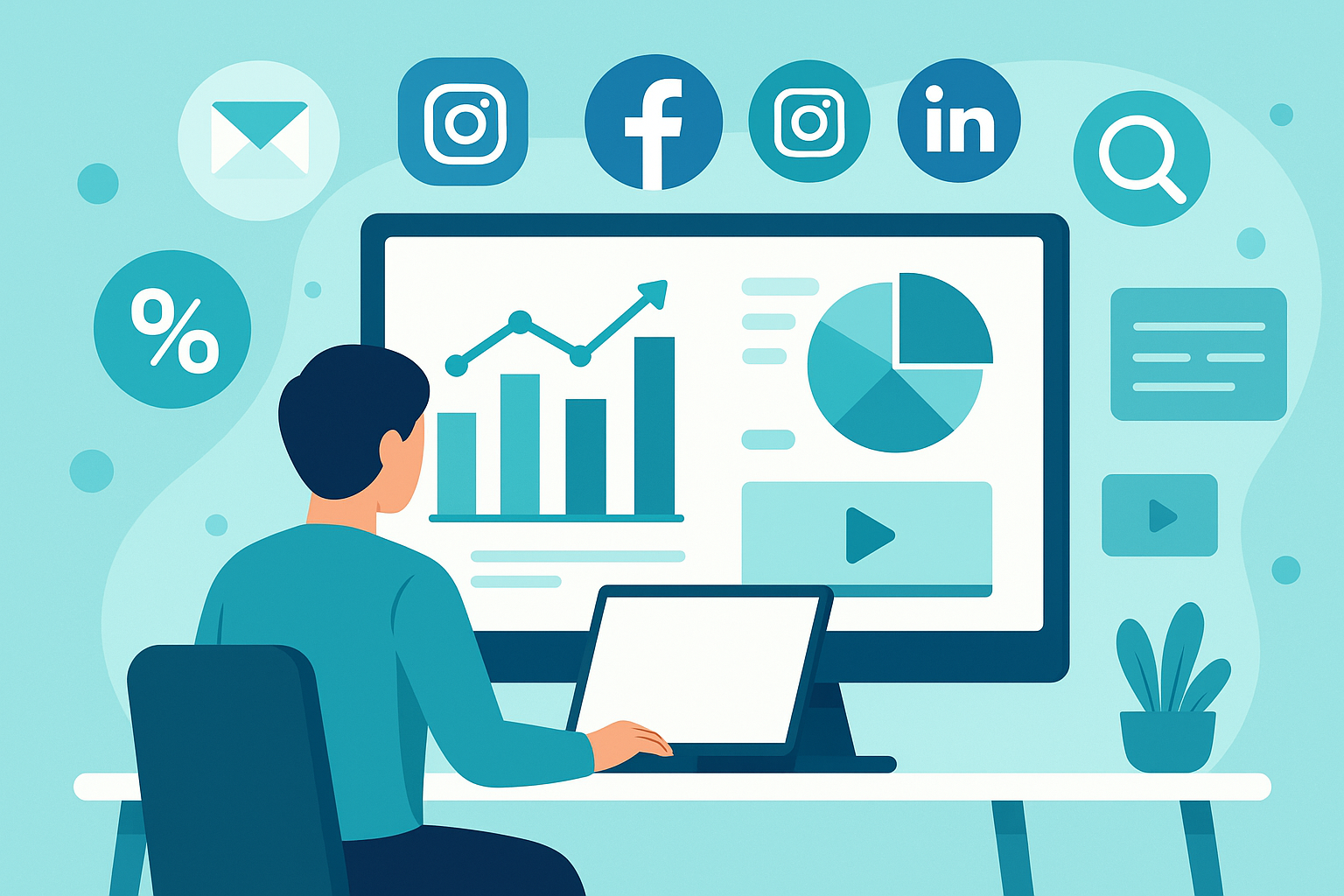In today’s hyper-connected world, businesses live and thrive online. Whether you’re a student, entrepreneur, freelancer, or working professional, mastering digital marketing can open doors to exciting opportunities across every industry. Enrolling in the best online digital marketing course not only helps you stay ahead of the curve—it empowers you with the tools needed to grow brands, attract customers, and drive real business results.
But what exactly does a digital marketing course cover? And how does it translate to real-world impact? Let’s break it down.
Why Digital Marketing Skills Matter Today
The way consumers engage with brands has evolved. Traditional marketing is no longer enough—digital marketing now plays a central role in everything from product discovery to customer retention. That’s why digital marketing has become one of the most in-demand skill sets in today’s job market.
Here’s what makes digital marketing a smart career choice:
- 📱 Massive demand across all industries
- 💼 Flexible career paths—freelance, remote, or full-time
- 💡 Constant innovation and creativity
- 📊 Clear, measurable results and ROI
- 🌍 Global reach and scalable strategies
Whether you’re looking to switch careers, grow your business, or build your personal brand, a digital marketing course can be your launchpad.
What You Will Learn in a Digital Marketing Course
Most comprehensive digital marketing courses are structured to build both theoretical understanding and practical expertise. Here’s what you can expect to learn:
1. Introduction to Digital Marketing
- History and evolution of digital marketing
- Key differences from traditional marketing
- Understanding the customer journey online
- Role of digital in modern business strategies
2. Search Engine Optimization (SEO)
- On-page and off-page SEO techniques
- Keyword research tools and strategies
- SEO content writing and structure
- Link building and domain authority
- Technical SEO and mobile-first indexing
3. Search Engine Marketing (SEM) and Google Ads
- Understanding Google Ads ecosystem
- Creating and optimizing paid ad campaigns
- Bidding strategies and Quality Score
- A/B testing and ad copywriting
- Landing page best practices
4. Social Media Marketing
- Organic vs. paid social strategies
- Facebook, Instagram, LinkedIn, YouTube, and TikTok marketing
- Building brand voice and content calendars
- Influencer marketing and user-generated content
- Running and analyzing social ad campaigns
5. Content Marketing
- Crafting content strategies for blogs, videos, and more
- Content funnels for different buyer stages
- Repurposing content across platforms
- Tools for planning, creation, and distribution
- Measuring content performance and ROI
6. Email Marketing
- Creating high-converting email sequences
- List building and segmentation
- Writing subject lines and CTAs
- Using automation tools (like Mailchimp or ConvertKit)
- Analyzing open rates, CTR, and conversion metrics
7. Web Analytics and Data Tracking
- Setting up Google Analytics and Google Tag Manager
- Interpreting traffic sources and user behavior
- Tracking goals and eCommerce performance
- Creating dashboards and reports
- Using data to optimize campaigns
8. Conversion Rate Optimization (CRO)
- Understanding user psychology and behavior
- Heatmaps, click maps, and A/B testing
- Optimizing landing pages and forms
- Reducing bounce rate and improving engagement
- Case studies on real campaign improvements
9. Affiliate Marketing and Influencer Strategy
- How affiliate marketing works
- Finding and managing affiliate partners
- Tracking affiliate sales and commissions
- Collaborating with influencers for reach and trust
10. Marketing Automation and CRM Integration
- Tools like HubSpot, ActiveCampaign, and Zapier
- Lead nurturing and lifecycle marketing
- CRM setup and segmentation
- Automating follow-ups and campaigns
Hands-On Practice and Real-World Projects
Top digital marketing courses focus heavily on implementation. Expect to:
- Build live campaigns on Google and Meta Ads
- Practice keyword research and content writing
- Analyze real traffic with Google Analytics
- Create a social media content calendar
- Launch an email drip sequence using automation tools
These hands-on exercises prepare you to work with clients, manage real budgets, and deliver measurable results.
Career Opportunities After Completing a Course
Once you’ve mastered the skills, a world of digital roles opens up:
- 📊 Digital Marketing Executive
- 🛒 Performance Marketer
- 📢 Social Media Strategist
- 🔍 SEO Specialist
- ✍️ Content Marketer or Copywriter
- 🧩 Marketing Automation Specialist
- 👨💻 Freelance Digital Marketer or Consultant
Whether you want a job, freelance work, or to grow your own business, your training sets the foundation.
FAQs
Q. How long does a digital marketing course usually take?
A. Most online courses range from 8 to 16 weeks, depending on depth and structure.
Q. Do I need a marketing background to join?
A. Not at all. Most courses are designed for beginners and teach you everything from scratch.
Q. Will I receive a certificate?
A. Yes, credible platforms usually provide certification upon completion which you can add to your resume or LinkedIn profile.
Q. What tools will I learn to use?
A. Google Ads, Google Analytics, Canva, SEMrush, Ahrefs, Meta Business Suite, Mailchimp, and more.
Q. Can I apply the skills to my own business?
A. Absolutely. Many learners use course knowledge to boost their startups or side hustles.
Enrolling in a digital marketing course is one of the smartest moves you can make in today’s digital economy. It empowers you with actionable skills, opens up flexible career paths, and enables you to deliver real results—whether for your own brand or someone else’s. If you’re searching for the best online digital marketing course to start your journey, look no further.
At TrainingSkhool, we offer hands-on, industry-relevant training guided by experts. Whether you’re a complete beginner or looking to upskill, our programs are built to deliver career-ready knowledge. Join us and take your first step into the exciting world of online digital marketing courses—where the future of marketing is already happening.
